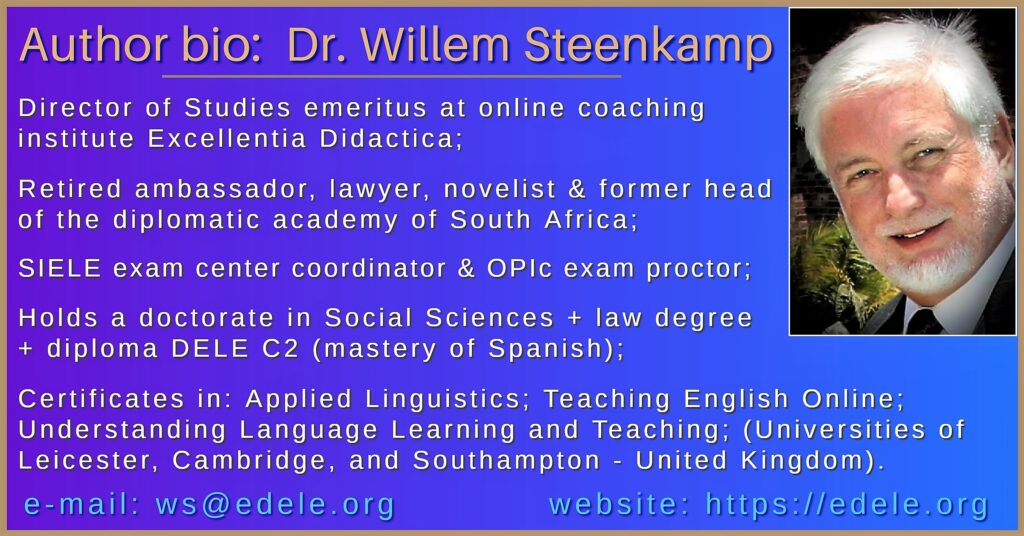HOW TO PREVENT YOUR SPANISH FROM RUSTING AWAY
By Dr. Willem Steenkamp: D. Litt. et Phil., DELE C2

You’ve put in the hard work. Your initial investment has paid off handsomely: you’ve passed your exam! Now the ongoing challenge becomes: How to prevent your Spanish from RUSTING AWAY?
Is acquiring a new language like learning to ride a bicycle? (In other words, once done, you never lose that skill?) Will that big initial investment in time and effort (and probably also money) keep paying off, if you don’t make regular small further investments, in order to maintain your gains?
The answer to that is: if you don’t maintain, you WILL lose your gains. Because one’s “can do” skills in the real-world use of any foreign language WILL start rusting away – if you don’t give yourself the opportunity to keep on practicing. Just like any athlete or artist will tell you will happen, regarding their own hard-won “can do” skills, if their training should lapse for some or other reason. Because science has proven that communicating in a foreign language is indeed more of a skill (rather than merely a knowledge set), and thus no different to sporting or artistic performance.
Fortunately, maintaining a skill level requires far less effort than what was needed to build it in the first place (or the effort required to build it anew, if you’ve allowed it to rust away).
This blog post will guide you on “how to prevent your Spanish from rusting away”. Because your initial investment was evidently too big, and too valuable, to allow your skills now to simply fade away due to not making the small invest required to keep it alive and well.
The key to acquiring / maintaining language = GUIDED PRACTICE
You may recall our earlier blog posts in which we described the human instinct for language. We also explained what recent advances in neuroscience have taught us about how we humans actually acquire language, in terms of the brain processes and circuits involved. If you want to refresh your memory about the role of pattern recognition and of the declaratory and procedural circuits of the brain, then you should click on these links to those two blog posts:
https://delehelp.org/improve-your-spanish-conversation-skills/

https://delehelp.org/dele-siele-oral-writing-how-to-learn-and-what/

To recap: we now know (thanks to the neurologists with their brain scanners) that humans acquire their “can do” language skills through pattern observation and guided PRACTICE. This is a reality that’s easily verified by the simple truth that toddlers aren’t taught formal grammar, nor made to memorize vocabulary lists – yet very quickly they acquire the ability to comprehend and to express themselves intelligibly. It is, above all, the procedural circuit of the brain (the one we rely on for all of our “can do” skills, whether it be communicating, participating in sport or performing some art form) that enables us to master language. This applies particularly to how effectively we use language to actually communicate, as opposed to merely having abstract knowledge of it. And that procedural circuit functions by way of three things: practice, PRACTICE and even MORE PRACTICE. Truly a case of (as the saying goes): practice makes perfect.
Just like sportsmen need to build, through practice, the required “muscle memory” so that they can execute moves reflexively, we have to internalise (also through practice) the patterns and lexicon of the language we are targeting, so that we too can respond reflexively – as we do when we speak in our mother tongue, which we have so internalised (when you speak in your first language, you certainly don’t consciously think about grammar!).

The problem of one’s skills rusting away, raises its ugly head when we haven’t yet fully internalised a new language to the same extent as our mother tongue – that is when (just as happens with sportsmen or artists who are prevented from practicing) we start to lose that essential “muscle memory” of the grammatical patterns, the lexis and the pronunciation of Spanish. And the only sure way of preventing that, is to continue with properly guided practice – knowing that IT WILL REQUIRE MUCH LESS EFFORT TO MAINTAIN, THAN TO RE-GAIN.
Such practice should take two forms – active practice of your skills at expressing yourself in Spanish, through guided conversation that provides you with proper corrective feed-back (which is why talking with friends is good, but not in itself sufficient, because they are very unlikely to give corrective feed-back). The second is passive practice, aimed particularly at maintaining your lexicon and keeping your ear attuned, by means of reading Spanish and by listening to talk radio or watching Spanish-language TV programmes.
ACTIVE CONVERSTATION PRACTICE is the most essential requirement in order to maintain your gains. But what if you don’t have opportunity to actively practice with Spanish-speaking friends, co-workers and the like? (Or, they don’t bother to correct you?). Our FLEXI-Spanish course is designed precisely for this. As the name suggests, it is highly flexible – both in terms of scheduling, and the content that you choose as theme for triggering conversation. As the little blurb says: It is Spanish coaching as YOU want it. Informal, conversational, with you at the helm of what you want to include.

So, if you want to maintain your gains and not see your hard-earned language ability in Spanish RUST AWAY, please go over to our website ( https://edele.org ), click on the scheduler and book a session of FLEXI-Spanish. It is fun and flexible, individualised for you and tailored to your preferences, allowing you to simply maintain your level, or – if you so desire – to continue building your skills.
YOU are in control of the scheduling, and can re-schedule or cancel, without penalty, up to one hour before the booked slot, with no questions asked. You do not need to commit yourself in advance to specific set days or time slots, week after week (unless you want to), but can reserve sessions and amend them, entirely at your (changing) convenience.
All the time knowing that this small investment in preventative maintenance will avert a big loss, as well as avoid the cost and effort of re-acquiring Spanish, if you should allow your skills to lapse.
We look forward to continuing to coach you – now much more informally under the FLEXI-Spanish banner, but with the same engagement and intent from your tutors as you have come to know and expect in the DELEhelp programme.
All the best in maintaining your Spanish, and congratulations again on having passed your exam!
Salu2
Willem

